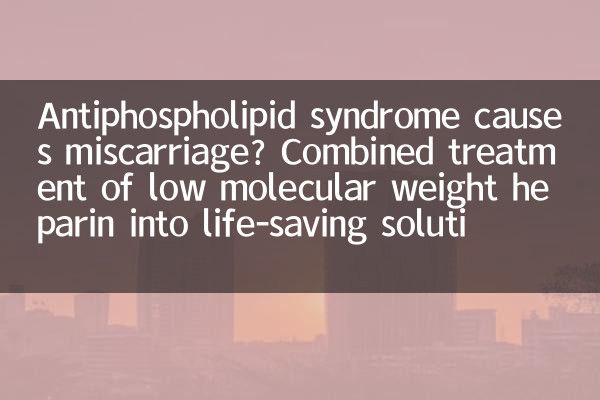Antiphospholipid syndrome causes miscarriage? Combined treatment of low molecular weight heparin into life-saving solutions
In recent years, the problem of recurrent miscarriage caused by antiphospholipid syndrome (APS) has attracted much attention. According to medical statistics, APS is one of the important causes of pregnancy failure, especially for pregnant women with unknown miscarriage. Recently, the treatment plans of low molecular weight heparin (LMWH) combined with other drugs have become a clinical hot spot, bringing new hope to patients with APS.
1. The association between antiphospholipid syndrome and miscarriage

Antiphospholipid syndrome is an autoimmune disease characterized by the production of antiphospholipid antibodies in the body, leading to thrombosis, abnormal placental function, and thus causing miscarriage. Here are the main mechanisms of APS causing miscarriage:
| mechanism | illustrate |
|---|---|
| Thrombosis | Antiphospholipid antibodies activate endothelial cells, promote thrombosis, and block placental blood flow |
| Abnormal placenta function | Antibodies directly damage the placental villus, resulting in placental dysplasia |
| Inflammatory reaction | Induce inflammation in the maternal and fetal interface, interfering with embryo implantation and development |
2. Combined treatment plan for low molecular weight heparin
Low molecular weight heparin is one of the core drugs currently used to treat APS-induced miscarriage, which improves placental blood flow through anticoagulation. In recent years, clinical studies have found that combining other drugs (such as aspirin, immunoglobulin, etc.) can significantly improve the success rate of pregnancy. Here are common combination treatment options:
| Treatment options | Applicable groups | Success rate |
|---|---|---|
| LMWH + Low Dose Aspirin | Patients with mild APS | 70%-80% |
| LMWH + Immunoglobulin | Patients with severe or refractory APS | 60%-70% |
| LMWH + glucocorticoid | Combined with other autoimmune diseases | 50%-60% |
3. Clinical data support
According to recent clinical studies, combined low molecular weight heparin treatment has shown significant effects in patients with APS-induced miscarriage. The following are some research data:
| Research Projects | Sample size | Treatment options | Live birth rate |
|---|---|---|---|
| 2023 Journal of Obstetrics and Gynecology | 120 cases | LMWH + Aspirin | 78.3% |
| 2024 "Reproductive Medicine" | 85 cases | LMWH + Immunoglobulin | 65.2% |
| Rheumatology 2024 | 60 cases | LMWH + glucocorticoid | 55.6% |
4. Treatment precautions
Although combined low molecular weight heparin therapy brings hope to patients with APS, the following issues need to be paid attention to in clinical applications:
1.Individualized medication: The plan needs to be formulated based on the patient's antibody level, thrombosis risk and previous pregnancy history.
2.Monitor coagulation function: Coagulation indicators should be tested regularly during treatment to avoid the risk of bleeding.
3.Joint multidisciplinary management: It is recommended that the rheumatism and immunology department and obstetrics and gynecology department participate in the treatment.
5. Future Outlook
With the deepening of medical research, the treatment plans for APS-induced miscarriage will be more accurate. At present, new anticoagulants, biological agents, etc. are in clinical trials, which are expected to further improve the success rate of pregnancy. For APS patients, early screening and standardized treatment are key.
If you or the person around you have a history of recurrent miscarriage, it is recommended to undergo anti-phospholipid antibody screening as soon as possible and develop treatment plans under the guidance of a professional doctor. Combined treatment of low molecular weight heparin may become your "life-saving solution".

check the details

check the details